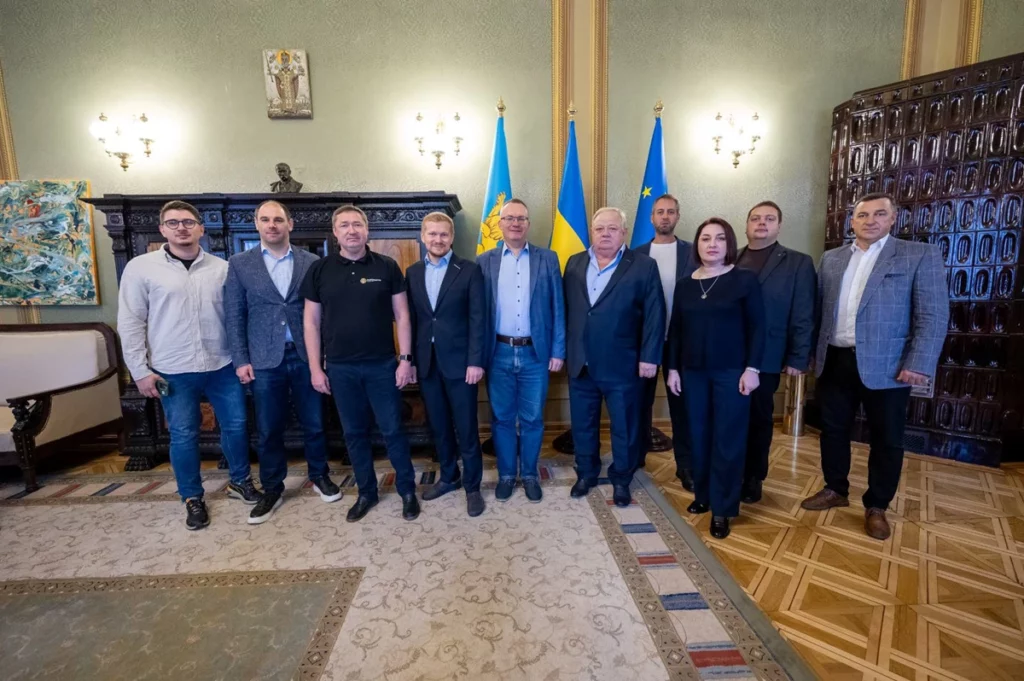“Made in Ukraine” initiative and catalogue of Ukrainian machinery manufacturers presented in Lviv region
Today, on 20 September, Lviv Polytechnic hosted an interagency meeting on public procurement of transport and municipal vehicles for communities.
Among the participants of the event were Maksym Kozytskyi, Head of Lviv Regional Civil Service Administration, Andrii Teliupa, Deputy Minister of Economy of Ukraine, MPs, business representatives, and the Federation of Employers of Ukraine.
“The President of Ukraine, the Ministry of Economy and the government in general have a vision that our main economic policy today is ‘Made in Ukraine’. We need to develop our own producers, so we are gradually doing everything we can to support them from different angles. In our opinion, Lviv Oblast in particular can be a leading region in this regard: both in terms of logistics and the relocation and development of industrial parks,” said Andriy Teliupa.
In addition to the issue of public procurement, the communities were presented with a catalogue of Ukrainian machinery manufacturers. It includes 255 vehicles manufactured by 32 companies from 14 regions of Ukraine.
In particular, the catalogue includes public passenger transport (buses, trolleybuses, electric buses and trams), municipal vehicles (sweepers, garbage trucks, watering and road machines, dump trucks, trawls, earthmoving machines), special vehicles (tankers, trailers and semi-trailers, fire and rescue vehicles, lifting equipment, ambulances, vans, etc, trailers and semi-trailers, fire and rescue equipment, lifting equipment, ambulances, vans and trucks), as well as attachments (buckets, road brushes, snow ploughs, pallet forks, mowers, leaf blowers, wood chippers, pruners and uprooters).
The Catalogue of Ukrainian Producers is an initiative implemented by the Federation of Employers of Ukraine in cooperation with the Ministry of Economy of Ukraine, the Association of Ukrainian Cities and the Office of MP Dmytro Kysylevskyi as part of the Made in Ukraine policy. The catalogue aims to provide customers with information about Ukrainian producers of equipment for communities and to increase demand for goods made in Ukraine.
The head of the Lviv Regional Military Administration, Maksym Kozytskyi, said that supporting Ukrainian equipment manufacturers is one of the main state priorities in times of war. He emphasised that localisation in public procurement is part of the national strategy “Made in Ukraine”, which was announced by President Volodymyr Zelenskyy.
“Now the communities of Lviv region lack almost 150 units of special vehicles, such as fire trucks and ambulances, and more than 200 buses to transport people between settlements. Ukrainian wheeled vehicles manufacturers can meet this need by 100% and provide high-quality transport. From buses and trams to garbage trucks, trawls and fire and rescue equipment, everything can be purchased in Ukraine.
Buying something made in Ukraine is no longer a trend. By buying from a national manufacturer, you are helping to keep the Ukrainian economy alive. And a vibrant economy is an opportunity for employees to support their families, it is donations to strengthen the army, it is taxes paid that go to the state budget and the sustainability of our communities.
By buying from Ukrainian companies, you have a guarantee that the money you pay will not turn into a “shahed” or a missile tomorrow to come kill you and your family, as sometimes happens with foreign companies that have an ambiguous position. I am asking the communities of our region to take this information into account when planning the next public procurement,” the head of the region said.
Ruslan Ilyichov, Director General of the Federation of Employers of Ukraine, during the presentation of the Catalogue of Ukrainian Machinery Manufacturers, noted that when communities purchase Ukrainian-made machinery, they launch a large chain of subcontractors and create tens of thousands of jobs across the country.
“For example, each bus produced in Ukraine employs more than 200 contractors. It is also worth noting that our plants are always ready to produce equipment for the specific needs of each community. In times of war, the availability of service for equipment and specialists plays a big role,” said Ruslan Ilyichov.
Oleksandr Slobozhan, Executive Director of the Association of Ukrainian Cities, noted that when Ukrainian manufacturers receive orders, communities receive more taxes than when purchasing imported products.
“I urge mayors and public procurement specialists of hromadas to purchase Ukrainian-made equipment. The factories that produce this equipment are located and pay taxes in hromadas. Industry always means “white salaries”, so communities across the country receive personal income tax,” explained Oleksandr Slobozhan.
The author of the localisation legislation, MP Dmytro Kysylevsky, noted that the demand for Ukrainian equipment from communities is one of the elements of Ukraine’s economic independence and its resilience in the face of war.
“The law on localisation has increased production in almost all industries covered by it. But the penetration of imports in public procurement is still shamefully high. Last year, the state spent about a trillion hryvnias on public procurement. About 400 billion of that was spent on imports. As a result, the budget lost between 100 and 160 billion hryvnias in taxes. Today, the Armed Forces of Ukraine lacks these funds. Managing public procurement in the interests of domestic producers is a sign of the state’s capacity,” said Dmytro Kysylevskyi.
The catalogue is available here.
As a reminder, in February 2024, President of Ukraine Volodymyr Zelenskyy announced the launch of a new economic policy, Made in Ukraine. It is designed to promote domestic production, attract investment in the real sector of the economy and increase non-resource exports.

